Had Sam dreamed of it? I waited for his next contact, but as the weeks passed he remained silent, and the last thing I felt like doing was calling him myself. I had enough people to lie to without adding him to the list.
Kate asked me how work was going, and I waffled about the details of the three uninspiring contracts I’d started recently. When I stopped talking, she looked at me as if I’d just stammered my way through an unconvincing denial of some unspoken crime. I wondered how my mixture of concealed elation and fear was coming across to her. Was that how the most passionate, conflicted adulterer would appear? I didn’t actually reach the brink of confession, but I pictured myself approaching it. I had less reason now to think that the secret would bring her harm than when I’d first made my decision to keep her in the dark. But then, what if I told her everything, and the next day Campbell was kidnapped and tortured? If we were all being watched, and the people doing it were good at their jobs, we’d only know about it when it was too late.
Campbell’s emails dropped off for a while, and I assumed he’d hit a roadblock. Sam had offered no further complaints. Perhaps, I thought, this was the new status quo , the start of another quiet decade. I could live with that.
Then Campbell flung his second grenade. He reached me by IM and said, “I’ve started making maps.”
“Of the defect?” I replied.
“Of the planets.”
I stared at his image, uncomprehending.
“The far-side planets,” he said. “ The physical worlds .”
He’d bought himself some time on a geographically scattered set of processor clusters. He was no longer repeating his dangerous incursions, of course, but by playing around in the natural ebb and flow at the border, he’d made some extraordinary discoveries.
Alison and I had realized long ago that random “proofs” in the natural world would influence what happened at the border, but Campbell’s theory made that notion more precise. By looking at the exact timing of changes to propositions at the border, measured in a dozen different computers world-wide, he had set up a kind of… radar? CT machine? Whatever you called it, it allowed him to deduce the locations where the relevant natural processes were occurring, and his model allowed him to distinguish between both near-side and far-side processes, and processes in matter and those in vacuum. He could measure the density of far-side matter out to a distance of several light-hours, and crudely image nearby planets.
“Not just on the far side,” he said. “I validated the technique by imaging our own planets.” He sent me a data log, with comparisons to an online almanac. For Jupiter, the farthest of the planets he’d located, the positions were out by as much as a hundred thousand kilometers; not exactly GPS quality, but that was a bit like complaining that your abacus couldn’t tell north from north-west.
“Maybe that’s how Sam found us in Shanghai?” I wondered. “The same kind of thing, only more refined?”
Campbell said, “Possibly.”
“So what about the far-side planets?”
“Well, here’s the first interesting thing. None of the planets coincide with ours. Nor does their sun with our sun.” He sent me an image of the far-side system, one star and its six planets, overlaid on our own.
“But Sam’s time lags,” I protested, “when we communicate—”
“Make no sense if he’s too far away. Exactly. So he is not living on any of these planets, and he’s not even in a natural orbit around their star. He’s in powered flight, moving with the Earth. Which suggests to me that they’ve known about us for much longer than Shanghai.”
“Known about us,” I said, “but maybe they still didn’t anticipate anything like Shanghai.” When we’d set Luminous on to the task of eliminating the defect—not knowing that we were threatening anyone—it had taken several minutes before the far side had responded. Computers on board a spacecraft moving with the Earth would have detected the assault quickly, but it might have taken the recruitment of larger, planet-bound machines, minutes away at lightspeed, to repel it.
Until I’d encountered Campbell’s theories, my working assumption had been that Sam’s world was like a hidden message encoded in the Earth, with the different arithmetic giving different meanings to all the air, water, and rock around us. But their matter was not bound to our matter; they didn’t need our specks of dust or molecules of air to represent the dark integers. The two worlds split apart at a much lower level; vacuum could be rock, and rock, vacuum.
I said, “So do you want the Nobel for physics, or peace?”
Campbell smiled modestly. “Can I hold out for both?”
“That’s the answer I was looking for.” I couldn’t get the stupid Cold War metaphors out of my brain: what would Sam’s hotheaded colleagues think, if they knew that we were now flying spy planes over their territory? Saying “screw them, they were doing it first!” might have been a fair response, but it was not a particularly helpful one.
I said, “We’re never going to match their Sputnik, unless you happen to know a trustworthy billionaire who wants to help us launch a space probe on a very strange trajectory. Everything we want to do has to work from Earth.”
“I’ll tear up my letter to Richard Branson then, shall I?”
I stared at the map of the far-side solar system. “There must be some relative motion between their star and ours. It can’t have been this close for all that long.”
“I don’t have enough accuracy in my measurements to make a meaningful estimate of the velocity,” Campbell said. “But I’ve done some crude estimates of the distances between their stars, and it’s much smaller than ours. So it’s not all that unlikely to find some star this close to us, even if it’s unlikely to be the same one that was close a thousand years ago. Then again, there might be a selection effect at work here: the whole reason Sam’s civilization managed to notice us at all was because we weren’t shooting past them at a substantial fraction of lightspeed.”
“Okay. So maybe this is their home system, but it could just as easily be an expeditionary base for a team that’s been following our sun for thousands of years.”
“Yes.”
I said, “Where do we go with this?”
“I can’t increase the resolution much,” Campbell replied, “without buying time on a lot more clusters.” It wasn’t that he needed much processing power for the calculations, but there were minimum prices to be paid to do anything at all, and what would give us clearer pictures would be more computers, not more time on each one.
I said, “We can’t risk asking for volunteers, like the old days. We’d have to lie about what the download was for, and you can be certain that somebody would reverse-engineer it and catch us out.”
“Absolutely.”
I slept on the problem, then woke with an idea at four A.M. and went to my office, trying to flesh out the details before Campbell responded to my email. He was bleary-eyed when the messenger window opened; it was later in Wellington than in Sydney, but it looked as if he’d had as little sleep as I had.
I said, “We use the internet.”
“I thought we decided that was too risky.”
“Not screensavers for volunteers; I’m talking about the internet itself . We work out a way to do the calculations using nothing but data packets and network routers. We bounce traffic all around the world, and we get the geographical resolution for free.”
“You’ve got to be joking, Bruno—”
“Why? Any computing circuit can be built by stringing together enough NAND gates; you think we can’t leverage packet switching into a NAND gate? But that’s just the proof that it’s possible; I expect we can actually make it a thousand times tighter.”
Читать дальше

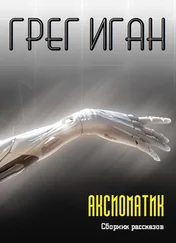
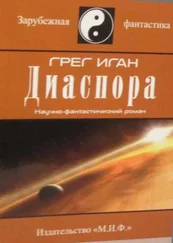
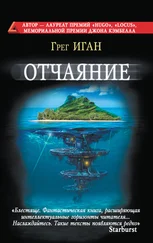
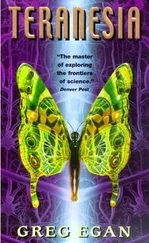
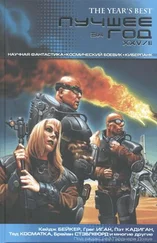


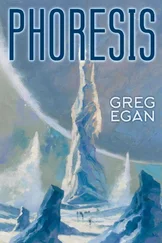
![Грег Иган - Рассказы [компиляция]](/books/419837/greg-igan-rasskazy-kompilyaciya-thumb.webp)
